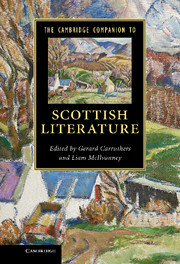Book contents
- Frontmatter
- Contents
- Notes on Contributors
- Acknowledgements
- Chronology
- Introduction
- 1 Scottish Literature before Scottish Literature
- 2 The Medieval Period
- 3 Reformation and Renaissance
- 4 The Aftermath of Union
- 5 Robert Burns
- 6 Enlightenment, Romanticism and the Scottish Canon
- 7 Scott and the Historical Novel
- 8 The Gaelic Tradition
- 9 Scottish Gothic
- 10 Victorian Scottish Literature
- 11 Robert Louis Stevenson
- 12 Hugh MacDiarmid and the Scottish Renaissance
- 13 Popular Fiction
- 14 Muriel Spark
- 15 The Glasgow Novel
- 16 ‘What is the language using us for?’
- 17 The Emergence of Scottish Studies
- 18 Otherworlds
- 19 Scottish Literature in Diaspora
- Index
- References
19 - Scottish Literature in Diaspora
Published online by Cambridge University Press: 05 January 2013
- Frontmatter
- Contents
- Notes on Contributors
- Acknowledgements
- Chronology
- Introduction
- 1 Scottish Literature before Scottish Literature
- 2 The Medieval Period
- 3 Reformation and Renaissance
- 4 The Aftermath of Union
- 5 Robert Burns
- 6 Enlightenment, Romanticism and the Scottish Canon
- 7 Scott and the Historical Novel
- 8 The Gaelic Tradition
- 9 Scottish Gothic
- 10 Victorian Scottish Literature
- 11 Robert Louis Stevenson
- 12 Hugh MacDiarmid and the Scottish Renaissance
- 13 Popular Fiction
- 14 Muriel Spark
- 15 The Glasgow Novel
- 16 ‘What is the language using us for?’
- 17 The Emergence of Scottish Studies
- 18 Otherworlds
- 19 Scottish Literature in Diaspora
- Index
- References
Summary
Between the 1820s and the Second World War, around 2.3 million Scots emigrated. Pre-nineteenth-century Scottish emigration included, variously, a significant mining community which went off to ply its trade in Poland, pedlars and merchants across the Baltic states, the plantation of Ulster and Catholics and Jacobites exiled in France, Germany, Italy and Spain. From the nineteenth century two principal phenomena accounted for Scottish emigration: the British Empire and the Clearances. One interesting pre-Clearances moment in Scottish literature is provided by Robert Burns in his poem, ‘Address of Beelzebub’ (1786). Here, satirically, Burns’s diabolic narrator salutes the earl of Breadalbane, president of the Highland Society. This had supported landlords such as Mr Macdonald in maintaining his people in abject poverty through preventing their projected emigration from his estates of Glengary to Canada. Burns’s knowledge of diaspora was of largely exciting greater potential abroad. This too, however, was not without a darker side, as Burns seems for a period in 1786 to have contemplated going to Jamaica to work as an official in the slave plantations. This route to greater prosperity was a well-trodden journey for hundreds of Scotsmen of good education but limited prospects at home in the latter half of the eighteenth century. Burns in the end did not go, but his possible alternative life in the West Indies is well imagined in a modern novel by Andrew Lindsay, Illustrious Exile (2006).
Tobias Smollett responds to another strong element of pre-nineteenth-century Scottish diasporic experience in his novel Roderick Random (1748), partly dealing with life on board a Royal Navy ship as a surgeon (along with the tobacco and slave trades, the military was the means by which many eighteenth-century Scots were introduced to, and frequently settled in, the New World). Although not without criticism of practices in the British navy, Roderick Random is generally enthusiastic about the imperial enterprise in which Britain is involved. Smollett himself had served on a man-o’-war and he is Scotland’s first major writer to live for a large part of his life abroad, not only in England, but in the West Indies (1741–4) and in France and Italy from 1766, Smollett dying in the latter country in 1771.
- Type
- Chapter
- Information
- The Cambridge Companion to Scottish Literature , pp. 275 - 288Publisher: Cambridge University PressPrint publication year: 2012
References
- 1
- Cited by

